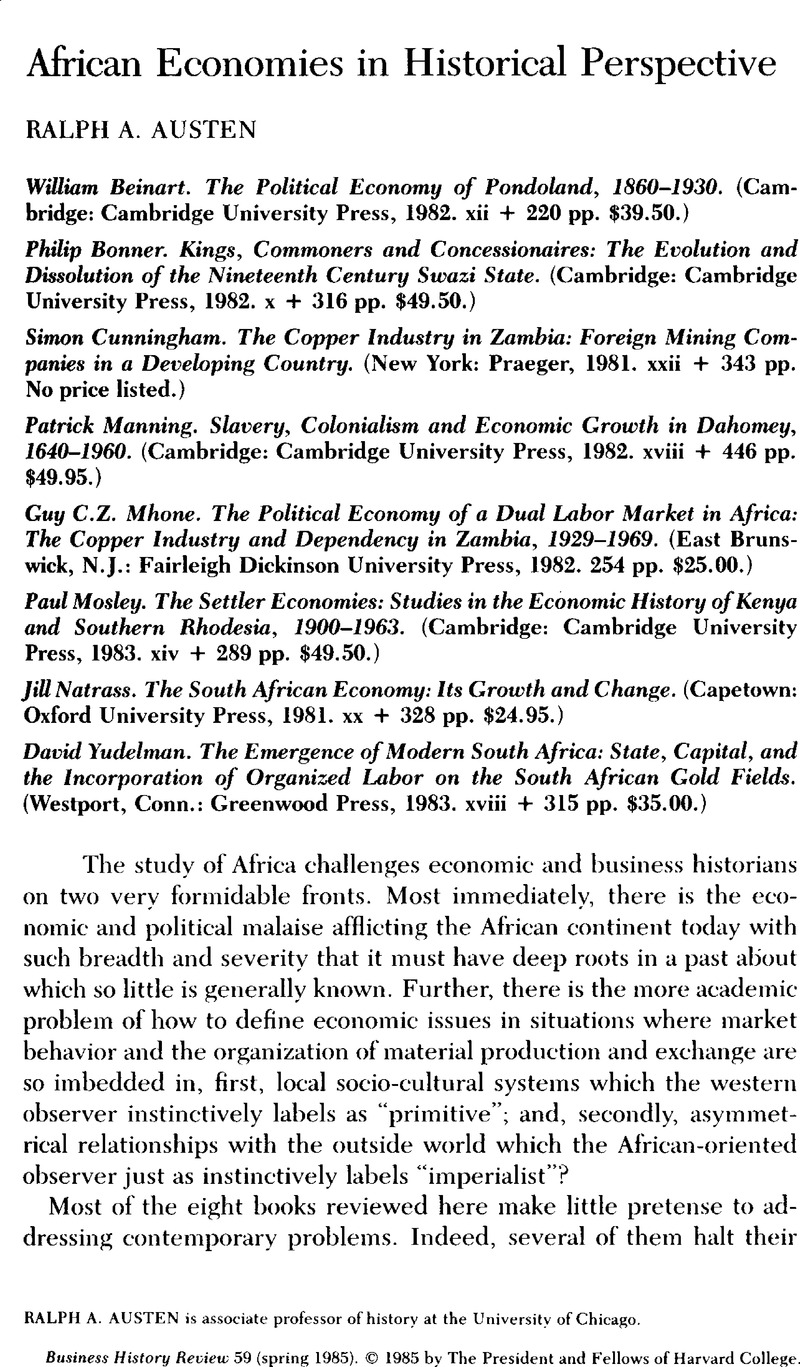No CrossRef data available.
Article contents
African Economies in Historical Perspective - William Beinart. The Political Economy of Pondoland, 1860–1930. (Cambridge: Cambridge University Press, 1982. xii + 220 pp. $39.50.) - Philip Bonner. Kings, Commoners and Concessionaires: The Evolution and Dissolution of the Nineteenth Century Swazi State. (Cambridge: Cambridge University Press, 1982. x + 316 pp. $49.50.) - Simon Cunningham. The Copper Industry in Zambia: Foreign Mining Companies in a Developing Country. (New York: Praeger, 1981. xxii + 343 pp. No price listed.) - Patrick Manning. Slavery, Colonialism and Economic Growth in Dahomey, 1640–1960. (Cambridge: Cambridge University Press, 1982. xviii + 446 pp. $49.95.) - Guy C.Z. Mhone. The Political Economy of a Dual Labor Market in Africa: The Copper Industry and Dependency in Zambia, 1929–1969. (East Brunswick, N.J.: Fairleigh Dickinson University Press, 1982. 254 pp. $25.00.) - Paul Mosley. The Settler Economies: Studies in the Economic History of Kenya and Southern Rhodesia, 1900–1963. (Cambridge: Cambridge University Press, 1983. xiv + 289 pp. $49.50.) - Jill Natrass. The South African Economy: Its Growth and Change. (Capetown: Oxford University Press, 1981. xx + 328 pp. $24.95.) - David Yudelman. The Emergence of Modern South Africa: State, Capital, and the Incorporation of Organized Labor on the South African Gold Fields. (Westport, Conn.: Greenwood Press, 1983. xviii + 315 pp. $35.00.)
Published online by Cambridge University Press: 11 June 2012
Abstract

- Type
- Review Essay
- Information
- Copyright
- Copyright © The President and Fellows of Harvard College 1985
References
1 For a valuable survey of a large body of this literature see Cooper, Frederick, “Africa and the World Economy,” African Studies Review 24 (1981): 1–86.CrossRefGoogle Scholar
2 The best account of this region's development is Hopkins, A.G., An Economic History of West Africa (New York, 1973).Google Scholar
3 Dahomey has, in fact, been used as a classic case to demonstrate the “nonmarket” economic behavior of Africans in Polanyi, Karl, Dahomey and the Slave Trade: An Analysis of an Archaic Economy (Seattle, 1966).Google Scholar
4 Berry, Sara S., “Work, Migration and Class in Western Nigeria: A Reinterpretation,” in Struggle for the City, ed. Cooper, Frederick (Beverly Hills, 1983)Google Scholar; Faure, Y.A. and Medard, J.F., eds., Etat et bourgeoisie en Cote d'Ivoire (Paris, 1982).Google Scholar
5 The main targets of this attack are Arrighi, Giovanni, The Political Economy of Rhodesia (The Hague, 1967)Google Scholar; Brett, E.A., Colonialism and Underdevelopment in East Africa (London, 1973)Google Scholar; Palmer, Robin and Parsons, Neil, eds., The Roots of Rural Poverty in Central and Southern Africa (Berkeley, 1977).Google Scholar
6 See the exchange between Mosely, and Choate, Stephen in Economic History Review 37 (1984): 409–16.Google Scholar
7 See especially Kitching, Cavin, Class and Economic Change in Kenya (New Haven, 1980)Google Scholar; Swainson, Nicola, The Development of Corporate Capitalism in Kenya, 1918–1977 (Berkeley, 1980)Google Scholar; Stichter, Sharon, Migrant Labor in Kenya: Capitalism and African Responses, 1895–1975 (London, 1982)Google Scholar; among works published earlier but not cited by Mosely, see Ranger, Terence, “Growing from the Roots: Reflections on Peasant Research in Central and Southern Africa,” Journal of Southern African Studies 5, no. 1 (1978): 99–133CrossRefGoogle Scholar; Weinrich, A.K., African Farmers in Rhodesia (London, 1975).Google Scholar
8 Perrings, Charles, Black Mineworkers in Central Africa: Industrial Strategies and the Emergence of a Black Proleteriat in the Copperbelt, 1911–1941 (New York, 1977)Google Scholar; this is a seminal work not cited by Mhone.
9 Bates, Robert H., Unions, Parties, and Political Development (New Haven, 1971)Google Scholar, Buroway, Michael, The Colour of Class on the Copper Mines (Lusaka, 1972)Google Scholar; Sklar, Richard, Corporate Power in an African State (Berkeley, 1978).Google Scholar
10 Houghton, D. Hobart, The South African Economy (Capetown, 1964)Google Scholar; Horwitz, Ralph, The Political Economy of South Africa (New York, 1967).Google Scholar
11 Innes, Duncan, Anglo-American and the Rise of Modern South Africa (New York, 1984)Google Scholar; an earlier statement of Innes's position is cited by Natrass, but not by Yudelman.
12 Ehrensaft, Philip, “Polarized Accumulation and the Theory of Economic Dependence: The Implications of South African Semi-Industrial Capitalism,” in The Political Economy of Contemporary Africa, ed. Gutkind, Peter C.W. and Wallerstein, Immanuel (Beverly Hills, 1976)Google Scholar; this very insightful essay tends to be ignored by the entire guild of writers on South African political economy.
13 Freund, Bill, The Making of Contemporary Africa (Bloomington, 1984).CrossRefGoogle Scholar
14 Bundy, Colin, The Rise and Fall of the South African Peasantry (Berkeley, 1979).Google Scholar
15 For this see Simkins, Charles, “Agricultural Production in the African Reserves of South Africa, 1918–1969,” Journal of Southern African Studies 7 (1981): 256–83CrossRefGoogle Scholar; also Beinart, William and Bundy, Colin, “State Intervention and Rural Resistance: the Transkei, 1900–1965,” in Peasants in Africa, ed. Klein, Martin A. (Beverly Hills, 1980).Google Scholar
16 Hedges, David W., “Trade and Politics in Southern Mozambique and Zululand in the Eighteenth and Early Nineteenth Centuries” (Ph. D. diss., University of London, 1978)Google Scholar; the alternative view is best summarized in Guy, Jeff, “Ecological Factors in the Formation of the Zulu State,” in Economy and Society in Pre-Industrial South Africa, ed. Marks, Shula and Atmore, Anthony (London, 1982).Google Scholar




